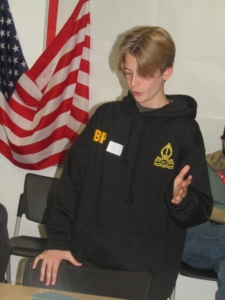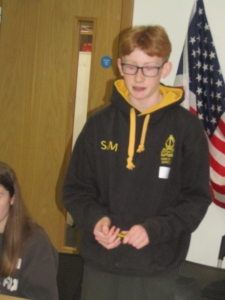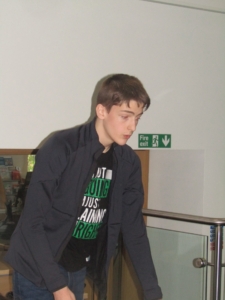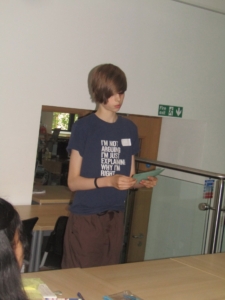Young TBSHS Debaters Make Their Mark
Girls’ Day School Trust and Bingham Competitions

Teams at Bingham
GDST Juniors
There are very few debating competitions in the Summer Term, but this year’s junior (Year 9 & below) event run by the Girls’ Day School Trust just happened to coincide with the TBSHS German immersion trip. This gave some very inexperienced debaters the opportunity to take the mammoth 31-stop Tube journey from Epping to represent the school at Putney High School. Of our four students, only Bede Pinches had attended a full interschool competition. His fellow Year 9 students Sam Jurd & Oisin Compton had only taken part in a practice debate at Herts & Essex and Calum Tait (Year 8), an eleventh-hour substitute, had never even spoken in a British Parliamentary-style debate.
 Bede Pinches & Sam Jurd
Bede Pinches & Sam Jurd
As in 2022, our students were the only male speakers at this competition and in the first round both our teams found themselves closing the case against the motion “This House Regrets the rise of short-form instant messaging.” Calum & Oisin took a little time to get involved in their debate, where the terms of the motion were not well-defined. However, they rattled the Bromley High School team with some well-chosen Points of Information., which Oisin followed up with some effective rebuttal. Calum held his own, summarising the Opposition case clearly and TBSHS gained a very encouraging second place, being beaten only by a South Hampstead High School that went on to finish in the top five overall. Meanwhile Bede and Sam spoke well in a room that contained the eventual winners from Putney. Both they and Mr Wagstaff felt that they deserved better than the fourth place that they were given.
The second motion was preceded by an information slide about Grouphome, a form of communal living where families share living spaces, domestic duties etc. Both our teams had to spoke first in favour of this style of living over that of the average family. In his room Bede explained the economic advantages of sharing household costs and mutual support in times of financial hardship, while Sam focussed on the personal and emotional benefits for children of growing up within a larger, more diverse social setting. Both students spoke confidently, engaging well with their opponents and thoroughly deserved the win that they achieved. Calum and Oisin gained another second place, beating Howell’s School from Cardiff and another team from Bromley High School.
After lunch, in the third debate, speakers were required to put themselves in the place of the captain of a space mission who was the only person who knew that there was a spy on board the spaceship. Both our teams were in the tricky ‘bottom half’ of the debate, arguing that the captain should “tell nobody”. Teams are placed in a room with those with similar results on the day, and Oisin & Calum found themselves up against three teams from South Hampstead, always formidable opponents. I felt that our students actually debated better than in the first round, giving well-structured speeches.
 Oisin Compton & Calum Tait
Oisin Compton & Calum Tait 
Calum argued that divulging the information would cause great panic and offered new alternatives, while Oisin made a good job of comparing the relative strengths of the cases expressed by each side. However, they were outclassed by more experienced adversaries and had to be content with fourth place. Sam & Bede fared a little better, being awarded third place in their room.
These results meant that the TBSHS pairs both finished on 4 team points, ahead of the only other state school representatives. Oisin and Calum finished in 19th place out of 32 teams, while Bede and Sam were 16th, with both boys in the top quarter of the speaker standings. Our four speakers were not the only TBSHS students to shine at this event. Fin Macfie & Semir Emara (both Year 10), who had made their interschool debut at GDST last year, had volunteered to act as assistant judges for the competition. They impressed the very experienced chair judges, mostly young graduates, so much that each of them was chosen to sit on the adjudicating panel for one of the final debates for teams that had performed particularly well, a real feather in the cap for TBSHS debating.
Congratulations to them and to our four speakers, all of whom seemed to enjoy themselves and to gain considerably from what is always a very friendly competition. Many thanks too, to Sam Bennett (Year 8), who came along to act as travelling reserve and to Mr Wagstaff, who both gave our teams great support throughout the day.
The Bingham Competition
Our last competition of the school year was a new departure. The Bingham Competition, run by South Hampstead High School, is only open to state school students who have represented their schools fewer than three times before. Teams consist of four students, all of whom can take part in the 15 minutes’ preparation, with only three actually speaking in a debate against one other team. We entered two squads – Bede Pinches, Sam Jurd, Oisin Compton & Cameron Clark from Year 9 and Felix Evans, Joshua Tsang, Noah Brown & Calum Tait from Year 8, to face 30 other teams in the Junior section over four preliminary rounds leading to a final between the two teams who had won all their debates.
The first motion, preceded by a couple of video clips featuring Mr Beast, a philanthropic Youtuber, was “This House Regrets the popularity of Mr Beast”. Both our teams, opposing the motion, defeated Catholic schools from London. In the second round, Noah, Joshua & Felix successfully proposed that secondary school exams should be abolished and replaced by coursework tasks.
Noah, Joshua & Felix
However, I felt that our Year 9 team made the job of opposing the motion more difficult for themselves by advocating an ‘exams only’ system rather than a mixture of assessment methods. Cameron, in his first interschool appearance, argued confidently that exams represent a better test of learning, dealt well with a point of information and summarised his points well. Sam engaged very well with his opponents’ points and drew attention to the fact that assessing coursework is more subjective than external exams and would increase teachers’ already excessive workload. Summing up against the motion, Bede refuted the Proposition’s arguments about the effects on students’ mental health by pointing out that exams would help to prepare them for similar pressures in the workplace. – “short-term pain outweighed by long-term gain”. This element of comparison helped the team to gain another well-deserved victory.
 Year 9 team – Bede Pinches, Sam Jurd, Oisin Compton & Cameron Clark
Year 9 team – Bede Pinches, Sam Jurd, Oisin Compton & Cameron Clark
Over a well-earned lunch, our teams reflected that such a successful morning meant that their afternoon debates would inevitably be more demanding, and so it proved. Proposing the reduction of the UK voting age to 14 against a combative team from Southend High School for Boys (a grammar school that has provided challenging opponents in the past), Calum produced a well-structured speech, pointing out that the decisions on issues such as climate change made by today’s politicians will affect tomorrow’s young adults for many years, so the latter deserve to have a say in elections and would be excited by the prospect. He was well backed up by Joshua, who argued that the current generation of 14-year-olds are more aware of politics than their predecessors, also promising more education about politics to further enhance their knowledge.

Year 8 team – Joshua, Noah, Felix & Calum
Noah rounded off the debate skilfully, correctly identifying the maturity of young people as a key issue and stressing that implementing the motion would make prospective governments more likely to offer policies aimed at them. Unfortunately, the judge did not favour the team’s proposal that teenagers should have to pass a test before being allowed to vote and awarded the win to the Opposition.
Meanwhile the Year 9 team, also proposing the motion, defeated a team from St Bede’s School (Cambridge), another familiar local rival. Still undefeated, in the fourth round, they found themselves up against the same SHSB team that had beaten our Year 8s. The intriguing motion was “This House Believes that superheroes should tell their loved ones about their secret identities”. Opening the case against the motion, Oisin reminded us that “their identity is a secret for a good reason”, arguing persuasively that superheroes’ loved ones could become a liability, as well as being made terrified and vulnerable by having to share the secret. Sam continued the case by pointing out that while superheroes would always have been aware of their powers, their loved ones would not and finding out would place great strain on their relationships. Summing up, Bede acknowledged the Proposition’s point that keeping their identities secret would place superheroes under great mental pressure, but suggested that they were better equipped to carry this burden than their loved ones would be and any relief at sharing their secret would be outweighed by worrying about the effect on those who knew. In a close decision, the Southend team was declared victorious, but they could not produce the same form in the final, where they were comfortably beaten.
Meanwhile, the Year 8 squad returned to its winning ways, meaning that both our teams recorded three wins out of four and finished in equal third place, a very pleasing outcome all round. Our students displayed excellent teamwork and debated confidently all day. Congratulations to them for representing TBSHS so well and to Mr Smith for coming along to support them.
A.D.Fraser



